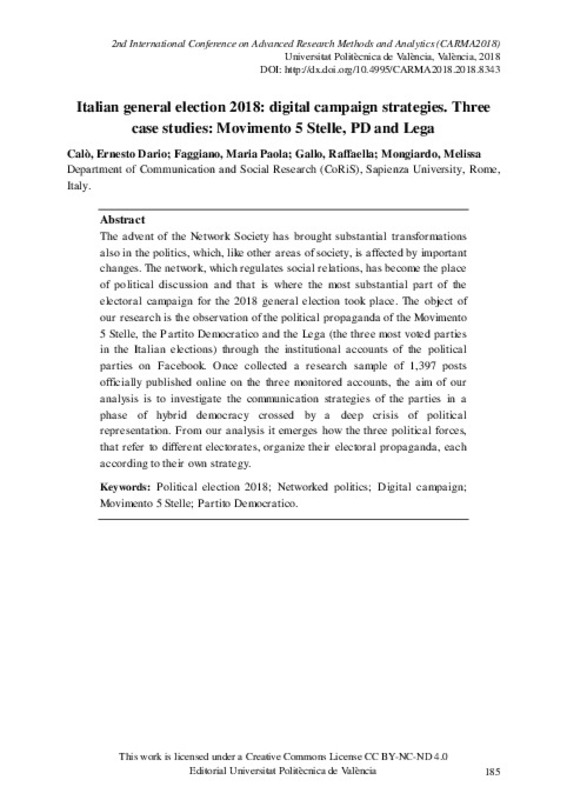JavaScript is disabled for your browser. Some features of this site may not work without it.
Buscar en RiuNet
Listar
Mi cuenta
Estadísticas
Ayuda RiuNet
Admin. UPV
Italian general election 2018: digital campaign strategies. Three case studies: Movimento 5 Stelle, PD and Lega
Mostrar el registro sencillo del ítem
Ficheros en el ítem
| dc.contributor.author | Calò, Ernesto
|
es_ES |
| dc.contributor.author | Faggiano, Maria Paola
|
es_ES |
| dc.contributor.author | Gallo, Raffaella
|
es_ES |
| dc.contributor.author | Mongiardo, Melissa
|
es_ES |
| dc.coverage.spatial | east=12.567379999999957; north=41.87194; name= Itàlia | es_ES |
| dc.date.accessioned | 2018-11-07T08:43:51Z | |
| dc.date.available | 2018-11-07T08:43:51Z | |
| dc.date.issued | 2018-09-07 | |
| dc.identifier.isbn | 9788490486894 | |
| dc.identifier.uri | http://hdl.handle.net/10251/112052 | |
| dc.description.abstract | [EN] The advent of the Network Society has brought substantial transformations also in the politics, which, like other areas of society, is affected by important changes. The network, which regulates social relations, has become the place of political discussion and that is where the most substantial part of the electoral campaign for the 2018 general election took place. The object of our research is the observation of the political propaganda of the Movimento 5 Stelle, the Partito Democratico and the Lega (the three most voted parties in the Italian elections) through the institutional accounts of the political parties on Facebook. Once collected a research sample of 1,397 posts officially published online on the three monitored accounts, the aim of our analysis is to investigate the communication strategies of the parties in a phase of hybrid democracy crossed by a deep crisis of political representation. From our analysis it emerges how the three political forces, that refer to different electorates, organize their electoral propaganda, each according to their own strategy | es_ES |
| dc.format.extent | 8 | es_ES |
| dc.language | Inglés | es_ES |
| dc.publisher | Editorial Universitat Politècnica de València | es_ES |
| dc.relation.ispartof | 2nd International Conference on Advanced Reserach Methods and Analytics (CARMA 2018) | es_ES |
| dc.rights | Reconocimiento - No comercial - Sin obra derivada (by-nc-nd) | es_ES |
| dc.subject | Web data | es_ES |
| dc.subject | Internet data | es_ES |
| dc.subject | Big data | es_ES |
| dc.subject | QCA | es_ES |
| dc.subject | PLS | es_ES |
| dc.subject | SEM | es_ES |
| dc.subject | Conference | es_ES |
| dc.subject | Political election 2018 | es_ES |
| dc.subject | Networked politics | es_ES |
| dc.subject | Digital campaign | es_ES |
| dc.subject | Movimento 5 Stelle | es_ES |
| dc.subject | Partito Democrático | es_ES |
| dc.title | Italian general election 2018: digital campaign strategies. Three case studies: Movimento 5 Stelle, PD and Lega | es_ES |
| dc.type | Capítulo de libro | es_ES |
| dc.type | Comunicación en congreso | es_ES |
| dc.identifier.doi | 10.4995/CARMA2018.2018.8343 | |
| dc.rights.accessRights | Abierto | es_ES |
| dc.description.bibliographicCitation | Calò, E.; Faggiano, MP.; Gallo, R.; Mongiardo, M. (2018). Italian general election 2018: digital campaign strategies. Three case studies: Movimento 5 Stelle, PD and Lega. En 2nd International Conference on Advanced Reserach Methods and Analytics (CARMA 2018). Editorial Universitat Politècnica de València. 185-192. https://doi.org/10.4995/CARMA2018.2018.8343 | es_ES |
| dc.description.accrualMethod | OCS | es_ES |
| dc.relation.conferencename | CARMA 2018 - 2nd International Conference on Advanced Research Methods and Analytics | es_ES |
| dc.relation.conferencedate | Julio 12-13,2018 | es_ES |
| dc.relation.conferenceplace | Valencia, Spain | es_ES |
| dc.relation.publisherversion | http://ocs.editorial.upv.es/index.php/CARMA/CARMA2018/paper/view/8343 | es_ES |
| dc.description.upvformatpinicio | 185 | es_ES |
| dc.description.upvformatpfin | 192 | es_ES |
| dc.type.version | info:eu-repo/semantics/publishedVersion | es_ES |
| dc.relation.pasarela | OCS\8343 | es_ES |








